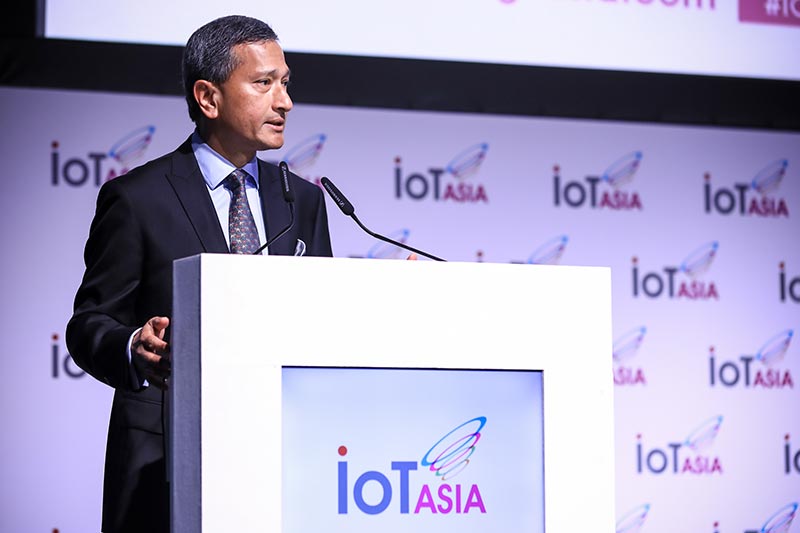
On Mar 21, speaking at the IoT Asia 2018 Conference, Minister
for Foreign Affairs and Minister-in-Charge of Smart Nation Dr Vivian
Balakrishnan outlined
Singapore’s approach to Internet of Things (IoT).
Minister Balakrishnan started off by
saying that platform technologies such as artificial intelligence (AI), machine
learning, robotics, big data and blockchain that are completely transforming
the way value is created.
Real revolution lies in technological platforms
The development of emerging
technologies is redistributing profits and wealth; and importantly for
citizens, it is disrupting jobs. As such, there is a lot of anxiety in the today’s
world about jobs, national competitiveness, free trade, the change in the
geo-strategic balance of power.
However, Minister Balakrishnan
pointed out that technology is the real revolution and real transformation.
Without
adequate knowledge and understanding of technology, all the anxiety on jobs,
competitiveness, and one’s place in the world will not be sufficiently
addressed.
Cost VS Value
Minister also shared his
observations that computing capacity and connectivity have drastically
improved. From the financial perspective, the cost of computing and price of connectivity
have been falling and trending to zero.
If the cost of computing, the cost
of connectivity and even the cost of marginal production is trending to zero,
where is the value?
Minister Balakrishnan believed that
real value creation in the future lies in imagination, innovation and services.
He stated that the deployment of IoT
is to create value by achieving the following objectives:
(1) to improve security and reliability of services consumed by citizens,
(2) to enhance quality and scope of services available to citizens,
(3) to increase business opportunities and boost overall competitiveness of the
economy.
Singapore’s approach to the deployment of IoT
In his speech, Minister Balakrishnan
outlined Singapore’s approach to the deployment of IoT. The key principles he shared are:
(1)
Avoid vendor lock-in
Minister Balakrishnan named the
existence of walled gardens the biggest hurdle for the deployment of IoT in the
world.
“Every big IT company wants to
create, behind its own wall, a unique ecosystem, and is trying to lock us in,” he
said.
However, Minister emphasised that it
is the duty of Governments and public officials to avoid being trapped by
vendors behind walled gardens.
(2)
Defining open standards
To avoid walled gardens, Minister stated
that there is a need for open standards that is generally accepted which would lead
the private sector to adapt their products and services.
Despite the need for open standards,
Minister acknowledged that it is “ultimately a political and regulatory issue”.
However, he also cautioned that the real
danger is when regulators are not on top of technology, and are unable to
understand and insist on standards, the country or economy would be prone to
walled gardens and vendor lock-in.
(3)
Use of modular platforms
Given the accelerated pace of
technological development, Singapore’s approach to IoT deployment is to keep
options open.
“As technology improves and options
change, we need to be able to plug in and plug out the relevant layers of our
vertical application stack. What I’m saying is, we need modular platforms,” said
Minister Balakrishnan.
Speaking
from his experience in programming, Minister shared that when working on
digital device, the simpler, the better.
“If you don’t need to run a full
stack operating system, don’t run it full stack. If you can get as low down, as
close to the metal as possible, and with as little code as possible, you likely
end up with products and software which are more reliable and more secure,” he
said.
As such, he advised the public to maintain
healthy scepticism over vendor offerings and to always take the attitude of being
open to cheaper, more effective, more reliable and more secure alternatives.
(4)
Provision of plug-and-play architecture
According to Minister Balakrishnan,
it is Government’s duty then to provide infrastructure, in particular,
connectivity, and then to provide the plug-and-play architecture.
“So that whatever your new product,
or your new service, or your new hardware platform is, it plugs and plays into
my system, and my system – because it’s defined by open standards – you can
programme your products and services to fit into this,” he explained.
(5)
Security by design
The emergence of technology means
that we are more vulnerable to security threats. As Minister puts it, we now
live in “an age of identity theft, fake news and fake data”.
“Having the smart cooling systems,
smart manufacturing systems, also by definition makes them extremely
vulnerable. You lose privacy, you lose security, and worse, it becomes
available to both state and non-state actors to sabotage critical public
infrastructure,” he cautioned.
As such, he emphasised that security
must be baked into products and services, by design, ab initio, rather than a
belated scramble to tack it on after they are rolled out.
“This requires intimate knowledge of
technology, of programming, and of design”, he added.
Minister pointed out the last point
in his speech, that beyond technology and the Government’s approach to
deployment, what is critical is giving people, businesses and leaders the relevant
training and skills to keep up with technology, in order to living through this
technological and digital revolution.
“If we can master the skills and
knowledge, and sharpen our judgement on how best to use technology, then our
experience from the last industrial revolution is that the countries and
regions who get it and deploy first, will make a disproportionate share of the
profits and wealth, and with that will come influence and some ability to alter
the trajectory of our region and perhaps, even the world,” said the Minister.
“We want a workforce, a country and ASEAN as a
whole to be masters of technology. We get it, master it, use it, profit from
it, and lives and livelihoods are transformed by it,” he concluded.
















